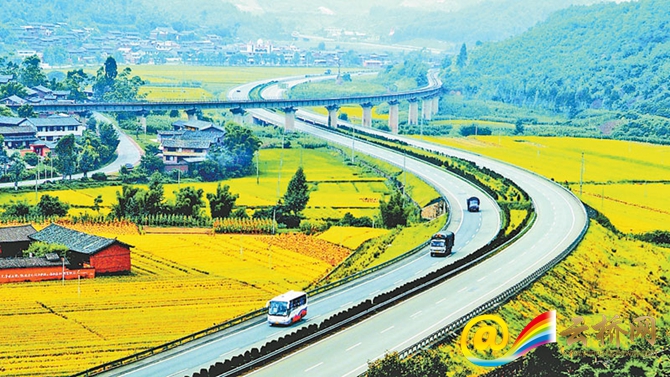Yunnan building new height in opening up

The construction of Yunnan’s transport infrastructure is speeding up. The picture shows Chuxiong-Kunming Expressway. Photo by Li Wensheng
Over the past five years, Yunnan province has adhered to two-way plan for full-scale opening up. Through these methods, it has taken a step forward in the construction as a pivot of China’s opening up to South and Southeast Asia. At the First Session of the 13th Yunnan Provincial People’s Congress, government deputies and Party members carried out heated discussions on how to accelerate the development of creating an open economy and building new ways to connect to the outside world over the next five years.
Achieving road connectivity
“To accelerate the process of opening up, we must first resolve the bottleneck of sluggish transport infrastructure,” said Huang Liyun, member of the Standing Committee of Yunnan Provincial People’s Congress. For example, taking facilities connectivity as a crucial starting point, Dehong Prefecture has greatly improved its level of opening up by advancing the construction of railways, highways and airports, as well as at major ports and border crossings.
Xie Dapeng, a deputy of the Yunnan Provincial People’s Congress, said that as the frontier of Yunnan’s opening up, Ruili will seize the opportunity to build itself to new heights. In terms of the construction of the China-Myanmar economic corridor, Ruili will step up cooperation with Myanmar and upgrade the Muse-Mandalay-Yangon economic and trade passage to promote further trade between the two countries.
Promoting unimpeded trade
Based on its regional advantage and resource superiority, Wenshan prefecture is currently building a Panax notoginseng industrial park, a mining and power generating centre, an industrial transfer hub handling goods from east China and a modern agricultural park focused on plateau-grown crops. The prefecture is striving to develop its biomedicine, big health industry, tourism and modern agricultural industries.
“Ports are important windows for opening up to the outside world, so we must step up the construction and development of our major ports,” said Yang Saiguang, also a member of the Standing Committee of the Yunnan Provincial People’s Congress. Since the relocation of the port of Houqiao in 2011, Tengchong City has invested 160 million yuan to upgrade its infrastructure systems and facilitate customs clearances. Now the port has been designated to receive imports of both fruits and grains.
Enhancing people-to-people bonds
Yunnan province has 25 counties adjacent to Laos, Myanmar and Vietnam along a border stretching for more than 4,060 kilometres. Across these lines, there have been close people-to-people exchanges. “In the process of Dehong opening up to the outside world, the most valuable experience has been its people-to-people bonds with neighbouring countries,” said Huang Liyun. Over the years, Dehong Prefecture has established more than ten regular cooperation and exchange mechanisms with Myanmar’s ministries of commerce and tourism. Dehong and Myanmar have been taking turns holding China-Myanmar border trade fairs and the Paukphaw Carnival for 16 consecutive years.
Over the past five years, Yunnan province has adhered to two-way plan for full-scale opening up. Through these methods, it has taken a step forward in the construction as a pivot of China’s opening up to South and Southeast Asia. At the First Session of the 13th Yunnan Provincial People’s Congress, government deputies and Party members carried out heated discussions on how to accelerate the development of creating an open economy and building new ways to connect to the outside world over the next five years.
Achieving road connectivity
“To accelerate the process of opening up, we must first resolve the bottleneck of sluggish transport infrastructure,” said Huang Liyun, member of the Standing Committee of Yunnan Provincial People’s Congress. For example, taking facilities connectivity as a crucial starting point, Dehong Prefecture has greatly improved its level of opening up by advancing the construction of railways, highways and airports, as well as at major ports and border crossings.
Xie Dapeng, a deputy of the Yunnan Provincial People’s Congress, said that as the frontier of Yunnan’s opening up, Ruili will seize the opportunity to build itself to new heights. In terms of the construction of the China-Myanmar economic corridor, Ruili will step up cooperation with Myanmar and upgrade the Muse-Mandalay-Yangon economic and trade passage to promote further trade between the two countries.
Promoting unimpeded trade
Based on its regional advantage and resource superiority, Wenshan prefecture is currently building a Panax notoginseng industrial park, a mining and power generating centre, an industrial transfer hub handling goods from east China and a modern agricultural park focused on plateau-grown crops. The prefecture is striving to develop its biomedicine, big health industry, tourism and modern agricultural industries.
“Ports are important windows for opening up to the outside world, so we must step up the construction and development of our major ports,” said Yang Saiguang, also a member of the Standing Committee of the Yunnan Provincial People’s Congress. Since the relocation of the port of Houqiao in 2011, Tengchong City has invested 160 million yuan to upgrade its infrastructure systems and facilitate customs clearances. Now the port has been designated to receive imports of both fruits and grains.
Enhancing people-to-people bonds
Yunnan province has 25 counties adjacent to Laos, Myanmar and Vietnam along a border stretching for more than 4,060 kilometres. Across these lines, there have been close people-to-people exchanges. “In the process of Dehong opening up to the outside world, the most valuable experience has been its people-to-people bonds with neighbouring countries,” said Huang Liyun. Over the years, Dehong Prefecture has established more than ten regular cooperation and exchange mechanisms with Myanmar’s ministries of commerce and tourism. Dehong and Myanmar have been taking turns holding China-Myanmar border trade fairs and the Paukphaw Carnival for 16 consecutive years.
Editor: Wang Shixue